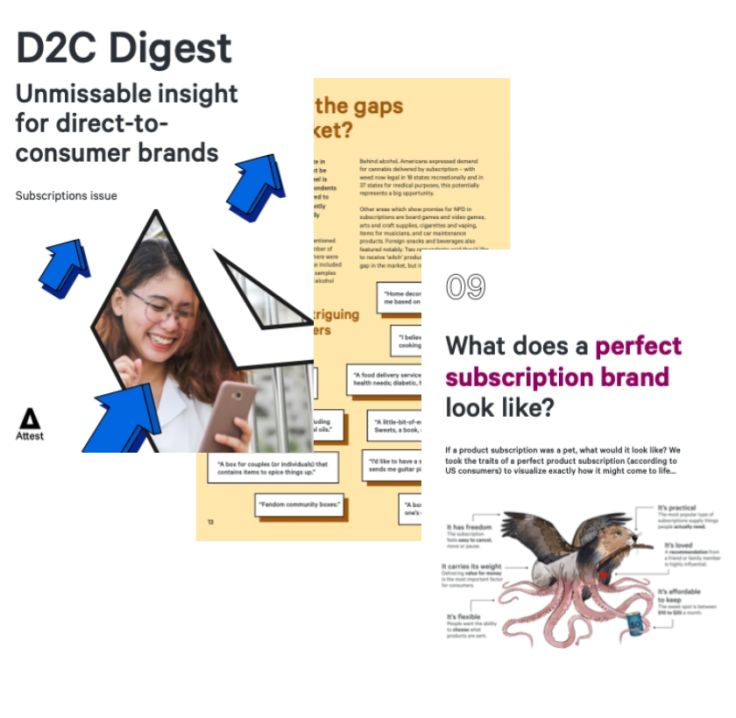How Americans Are Turning Away From Product Subscriptions
While many industries and businesses struggled to adapt to the unprecedented market conditions during the coronavirus pandemic, e-commerce experienced quite the boom. It's not surprising that with many people stuck at home, demand for goods to be delivered to doorsteps grew.
As well as the necessary items such as groceries, many Americans found time to indulge in their hobbies and pastimes — such as gardening, reading and spending time with their pets — during lockdowns. In a great deal of cases, consumers committed to these deliveries on a regular basis, with subscription box services being among the star performers in the e-commerce category during Covid-19.
But now it seems Americans are falling out of love with subscriptions. As life begins to return to normal, the number of us who have signed up to subscription services has dropped. If the subscription sector is going to recover, it needs to look toward younger generations and new product categories.
State of subscription economy in the US
According to the latest data from Attest's D2C Digest, some 26% of US consumers aged 18-40 purchased a new subscription during the pandemic. But now, just 41% of Americans say they have an active product subscription, compared to 47% of consumers in 2020. Only 18% still have multiple active subscriptions — this figure was 21% last year. Here is the research dashboard.
The millennial generation are the most avid subscribers, with 49% having one or more. But one generation up, Gen X are the most likely to report that they had cancelled a product subscription. Overall across all Americans, 29% say they have never had a product subscription — a figure that hasn't changed between 2020 and 2021.
The main reason Americans give for rejecting product subscriptions is that they can’t afford it (35.5%). Some 23.5% of people cite the fear of getting locked in, rising to 31% of Boomers. While this is something brands could easily mitigate with flexible subscription terms and simple cancellation processes, to fully understand what subscription box services need to do better to address their decline, we need to look at the key reasons why people choose subscriptions in the first place.

The top reason for purchasing a subscription is because the product is delivered straight to the customer's door, with 32.3% citing this. Among Boomers the number is 45%, suggesting this generation places more value on convenience than younger age groups. The second biggest motivator for signing up to a product subscription is that it provides good value, at 22%. Meanwhile, 16% purchased because it provides them with a regular treat.
There was a significant drop from 2020 to 2021 in the number of people who said that a brand's ethos was important to them in making the decision to sign up to a subscription, from 18% to 10%. However, this is still an important factor for the youngest generation, Gen Z, with 16% citing it as a key reason for purchasing a subscription.
Untapped potential for subscription services
The good news for subscription box services is that there does look to be some untapped potential in the market. There are actually more consumers who are open minded to purchasing a subscription now — only 21% of respondents said they'd be unlikely to consider a subscription, down from 27% last year.
Millennials are most likely to be actively scoping out product subscriptions at 17.5%, while just 6% of Boomers said the same. Sixteen percent of Gen Z and 14% of Gen X said they’re currently looking at subscription options.
So what is it that people want from subscription services? Practical product subscriptions that replenish the things people run out of are still the most popular type compared to last year. The second most coveted type of product subscription is one that encourages people to try something new, while indulgent product subscriptions are the least popular type.
Understandably, then, the Food & Drink category is the leading category Americans would consider for a new subscription with 51% expressing an interest. Personal Care, Health & Fitness is the second most popular, with 44% interested in a subscription in this category, and Clothing & Shoes is in third at 39%.
Gaps in the subscription marketplace
Respondents also pointed out some interesting gaps in the market, notably cannabis products. With cannabis now legal for recreational use in 18 states, there looks to be room developing for subscription services in this area. While alcohol subscriptions are already well catered for, there was also an interest in services which paired alcohol with other types of product such as cigars.
Around seven out of 10 consumers want to get value for money out of their product subscriptions. The second highest ranked factor is that the subscription offers the ability for customers to choose what products are sent, with 54% of people saying this. In a close third, 53% of respondents wanted a subscription that could be easily paused or cancelled.
One of the key factors subscription services need to be wary of is how much people are prepared to spend. Very few respondents — 13% — said they would be prepared to pay more than $50 a month, while the most common answer was between $10 to $20 a month, at 30%.
It's clear, then, that many opportunities exist in this market, but subscription box services are going to have to work harder and provide more for less. Value for money, flexibility and convenience are still very much top of the agenda for potential subscribers, but the most obvious gap for subscription services is to expand into new and niche product categories — board games and video games, arts and craft supplies, cigarettes and vaping, items for musicians, car maintenance products, and foreign snacks and beverages were all cited by respondents.
(Jeremy King is the CEO of Attest)
© Copyright IBTimes 2025. All rights reserved.





















